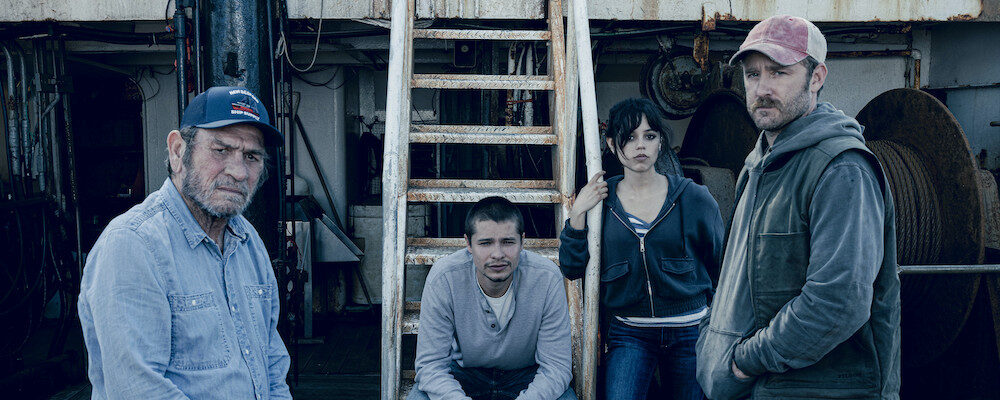‘Finestkind’: Nautical Crime Caper Flounders in Hackneyed Waters
Tony Sokol
“Finestkind,” the title of writer-director Brian Helgeland’s nautical crime caper, can mean anything in Boston’s riverfront slang. Called the “Swiss army knife of words,” it could refer to a great crew, or a jaunty “fuck you” to the port authorities. It also happens to be the name of the only vessel captained by Tom Eldridge (Ben Foster) that doesn’t sink after his younger half-brother Charlie Sykes (Toby Wallace) joins the crew. The ship-shape highliner may dodge a run aground, but definitely runs afoul of territorial waters and the legal limits of the New Bedford, Massachusetts Coast Guard.
The feature sets its initial course for the intrepid waters of family drama, with Charlie taking on the coming-of-age role with fringe benefits. He’s set to begin law school at Boston University, but wants to find himself over his last summer vacation. Tom reluctantly lends him a compass, consigning him to dredge duty on the Harmony, the fishing high liner he’s skippering. Tom does it both out of respect for their shared mother, Donna Sykes (Lolita Davidovich), and to piss off Charlie’s disparaging but rising attorney father, Gary Sykes (Tim Daly), who wants to stick his son in the safety of a clerical office.
“Finestkind” establishes the family dynamic quickly and efficiently, as does the comradery of the crew, slated to be the only shared company on a 10-day scallop-fishing expedition. Helgeland presents an immersive look at the work that goes into the job, detailing everything with the ease as Charlie gets his sea legs, learning port from bow, sternly informing what’s right with language and wrong with Justin Bieber. Even Mabel (Jenna Ortega), the charismatically subjugating bar friend whose mom has connections, brings an instantly lived-in feel to the film. Mabel is hell on wheels, driving like a true community college student, but can’t get through “Moby Dick,” while Charlie can’t get through to Tom’s Captain Ahab style of navigation, especially on land.
The only fish out of water would be “that son of a bitch Ray Eldridge everyone tries to steer clear of,” played by cantankerous veteran Tommy Lee Jones, who casts Texas wisdom to the New England winds and Lonestar cautionary tales to the North Atlantic currents, but fits right in at his son Tom’s regular bar, with a dedicated parking spot for his Gran Torino. Ray has terminal stomach cancer, and is looking for ways to relieve what’s eating him up inside. Jones lets the weight of his combined experience carry his physical performance, from his pained limp to the arthritic grip he impossibly maintains in his donut shop shootout, and while harmonizing with whale songs.
Tom is an acetylene torched slice off his father’s gib. He can manage a crew, but isn’t exactly a team player when it comes to the suits who foot the bills, especially when they don’t check the equipment on the vessels assigned. He also defies his father’s explicit instructions to stay on course, run under 12 knots, and keep the vessel out of Canadian waters. The Canadian Coast Guard, which runs an aerial photo attack in pre-recognizance, doesn’t share fishermen’s sense of humor. They get their giggles impounding Ray’s boat under a $100,000 fine, and barring him from his awaited floating hospice.
“You live, you die. It’s what you do in between that counts,” Roy says, though it will echo from each character moving forward. Even though Tom turns down his father’s offer of ownership of the Finestkind, that doesn’t mean he wants to see it in the hands of his remorseless ex-boss. He’d rather scuttle the ship. The best way to do that is to listen to his budding-law-school-dropout-at-best little brother, Charlie, and do whatever dope deal Mabel cooked up with her mother’s works. The Boston gang is actually an interesting cast of minor characters, obviously a family dynamic which both plays against, and mirrors all the families involved.
Pete Weeks (Clayne Crawford) is the very picture of relaxed bonhomie, until the split second he isn’t and blood stains a linoleum floor, mingling with an already ongoing medical emergency. Weeks knows the score, and doesn’t care. He is the gangster that directors like Quentin Tarantino warn you about, but usually wind up on subversive TV series like “Better Call Saul.” Weeks runs a family business, not unlike the Corleone Family from “The Godfather,” only smaller, which means every member can be trusted like family. Weeks and his brothers and cousins are the most functional family in “Finestkind.” They offer the dark side of family business as an alternative story of fathers and sons and blue-collar/white-collar choices.
“Finestkind” succeeds as a family drama, and should have upped the ante when Charlie’s father Gary softens on the business side of scallop hauling. Cinematographer Crille Forsberg captures so much on-the-job satisfaction, the feature could serve as an effective merchant marine recruitment film, just watching Charlie go at the shells should pull would be mariners.
However, when Tom steers the Finestkind into Canadian waters, the film takes on ballast, barely able to regain course as the story is caught in the undertow of crime thriller. Helgeland, who wrote “L.A. Confidential” and “Mystic River,” pummels the audience with the white caps of clichés. The first half is a unique tale. The second is a movie we’ve seen.
“Finestkind” could have pulled it off if the ending weren’t such a saccharine repeat of ‘80s feel-good movies. Crew members mooning prison transport may be evergreen triumphs, but the rest veers directly into overkill, negating any accomplishments the film did achieve.
“Finestkind” begins streaming Dec. 15 on Paramount+.

